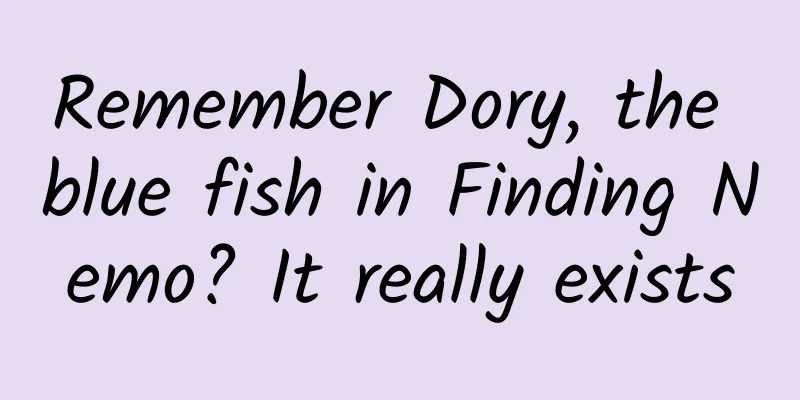Remember Dory, the blue fish in Finding Nemo? It really exists

|
Blue devil fish mainly inhabit the coral reefs of the Indo-Pacific Ocean, from the coast of East Africa to the Hawaiian Islands, from southern Japan to the Great Barrier Reef of Australia. They prefer clear and warm waters, usually swimming in groups around coral reefs, feeding on plankton, algae and small invertebrates. The most striking thing about the blue devil fish is their bright body color. Their body is oval, flattened, and bright royal blue. There is a striking black spot on the back near the tail peduncle, which looks like the paint on a painter's palette, so they are also called "palette fish". Dory's amnesia in the movie makes people laugh, but in reality, the blue devil fish does have a relatively short memory. Studies have shown that the memory ability of fish varies from species to species. Some fish can remember information for months or even years, while the memory of the blue devil fish is relatively short, perhaps only a few weeks or even days. However, short-term memory does not mean that blue devil fish are "stupid fish". On the contrary, it may be a survival strategy they have developed during the evolution process. The coral reef environment is complex and changeable, full of dangers. Blue devil fish need to stay vigilant at all times to deal with the threat of predators. Short-term memory can help them quickly forget dangerous experiences and avoid being in fear and stress for a long time, so as to better adapt to the environment and increase their chances of survival. Blue devil fish are typical social fish, they usually move in groups, the size of the group ranges from dozens to hundreds. Group life brings many benefits to blue devil fish: Fight the enemy together. When encountering a predator, the blue devil fish will quickly gather together to form a dense school of fish to confuse the predator and reduce the risk of being eaten. Information sharing. Individuals in a group can exchange information, such as finding food sources or avoiding dangerous areas, to improve the survival chances of the entire group. Reproductive advantage: Living in a group helps blue devil fish find mates and improves the success rate of reproduction. Blue devil fish play an important role in the marine ecosystem. As a member of the coral reef ecosystem, they feed on algae, which can control the excessive growth of algae and maintain the balance of the coral reef ecosystem. In addition, blue devil fish are also a food source for other marine organisms and participate in the circulation of marine substances and energy flow. The success of Finding Nemo has made the blue devil fish a household name, and has also raised concerns about the fishing and trade of blue devil fish. Factors such as overfishing, habitat destruction and climate change all pose threats to the survival of the blue devil fish. To protect this beautiful species, we need to: reduce pressure on wild populations. Support a sustainable ornamental fish trade and choose artificially bred blue devil fish. Actively participate in marine conservation actions to reduce pollution and protect coral reef ecosystems. The story of Dolly the Blue Demon Fish is not only a story about courage and friendship, but also a story about marine life and ecological protection. Let us work together to protect these beautiful blue elves, let them continue to swim freely in the vast ocean, and continue to write their legendary stories. References [1] Ke Huaiyang, Zhang Yankun, Zhang Jiliang, et al. Ecotoxicological effects of benzophenone (BP-3) on yellowtail blue devil fish (Chrysiptera parasema)[J]. Journal of Ecotoxicology, 2022, 17(05): 75-81. [2] Froese, R., & Pauly, D. (Eds.). (2023). Paracanthurus hepatus in FishBase. Retrieved from [3] Allen, GR, & Erdmann, MV (2012). Reef Fishes of the East Indies. Tropical Reef Research. [4] Sadovy, Y., & Vincent, ACJ (2002). Ecological issues and the trades in live reef fishes. In Coral Reef Fishes: Dynamics and Diversity in a Complex Ecosystem (pp. 391-420). Academic Press. |
<<: Life Encyclopedia丨Is it really good to have a full refrigerator?
>>: China Hernia Day丨Don’t ignore the small matter of “hernia”! Talk about “hernia”
Recommend
How to analyze the 4 characteristics of online hot spots through user psychology
With the Internet so developed today, every hot s...
Product strategy for search ads
Bidding advertising products: product strategies ...
"Trimming horse hooves, washing carpets, squeezing blackheads..." Why can't you stop watching these videos?
Produced by: Science Popularization China Author:...
How to quickly increase fans on Kuaishou? How to buy Kuaishou fans?
Professional Douyin and Kuaishou likes-boosting p...
A must-read for operators: What is the conversion rate of attracting new customers through SMS?
SMS marketing is the standard for notifications o...
Learn how to promote new products from "What's Peppa Pig?"
When I woke up early last Friday (January 18), I ...
Master the underlying logic of private domain traffic!
Private domain traffic is not simply about adding...
How big is the difference between bottled water that costs 1 yuan, 2 yuan, and several hundred yuan?
Expert of this article: Pan Jingwen, Assistant En...
The older you get, the more forgetful you become. This is actually because your brain is constantly improving.
Many people think that forgetting is not a good t...
Summary of mobile application development trends in 2015
The improvement of hardware performance and the e...
The doctor said I have a "nodule". Is it okay not to have it removed?
Reviewer: Qu Bo Chief Physician of General Surger...
How much does it cost to be an agent for a fresh food mini app in Daqing?
How much does it cost to be an agent of Daqing’s ...
Can “one injection to lose weight” really help you lose weight while lying down?
Losing weight is like going through a trial, whic...
Apple releases iOS 9 fifth test, third public beta
Apple today released iOS 9 beta 5 to developers, ...
The methodology for launching hot-selling products on Douyin!
In July, a super skin care product quickly became...









